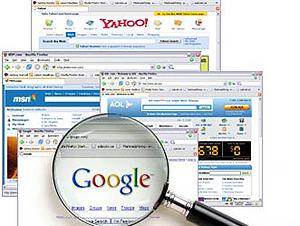Religiously safe search
(Image: Flickr user Danard Vincente (cc: by-nc-sa))
Story by Cyrus Farivar, “The World”
In Islam, something that is “haram” is considered forbidden. The opposite of haram is “halal,” which means permissible.
Now, a new Internet search engine is trying to help practicing Muslims sort out the various levels of what is forbidden, offering up “clean” search results. It’s called I’mHalal, and it claims to be the world’s first custom-designed “Islamic search engine.”
Som Pourfarzaneh, a doctoral student at the Graduate Theological Union in Berkeley, California, studies Muslims in America, like himself.
He says I’mHalal is an example of Muslims trying to negotiate their theology and their values in a secular, public sphere like the Internet.
I’mHalal.com was created by Reza Sardeha, a 20-year-old Iranian studying business in Amsterdam.
“Our goal was actually to create a safe and clean environment for those people and Muslims from all over the world who really don’t want to bump into explicit content,” according to Sardeha.
Sardeha says that he consulted for months with imams and other Muslim scholars in the Netherlands to come up with a list of search terms that could potentially be problematic for observing Muslims.
His site launched in early September. It has three levels of warnings for users. The first one being for relatively minor things that are haram, like alcohol and pork.
“Level 2 is probably a search term which could be risky because some keywords, for example, like the term sexual education is perfectly fine,” said Sardeha. “People still got the chance to click through and see the result and inform themselves.
“Level 3 is really a no go. If you get a Level 3, the content that will be fetched as highly inappropriate, and therefore you won’t get the chance to click through.”
This isn’t the first religious themed search engine. There are already a number of Christian ones; and at least one Hebrew language, ultra-Orthodox Jewish search engine.
In January, a Moroccan company started “Islamic Google,” figured out a way to filter Google searches for Islam-friendly sites. And in June, a Saudi company even launched NaqaTube, a clean and Islamically pure version of YouTube.
Som Pourfarzaneh says there’s a growing demand for such websites. Porfarzaneh also points out that the finer points of what exactly is haram and halal are up for constant debate, depending on the particular religious school or tradition.
Still, in its first two weeks of operation, I’mHalal reported that it had received hundreds of thousands of visitors to its site. Some are skeptical that Muslim Internet users around the world will really embrace the concept of a restrictive search engine.
Helmi Noman is a Yemeni researcher with the Berkman Center for Internet and Society at Harvard University. He studies the Internet in North Africa and the Middle East, which he says is already very restrictive.
“Governments and authorities implement and impose different forms of censorship, installing cameras in Internet cafés, requiring Internet users in cyber cafes to provide their names and IDs before they can use the services in Internet cafés, in addition to arresting and harassing online writers and activists. So I do not think that users in the region would add another layer of filtering by using these services.”
But the creator of I’mHalal is optimistic. Reza Sardeha says he’ll continue to improve the searching mechanism, and he hopes that by this time next year I’mHalal will be the number one search engine in the Middle East.
PRI’s “The World” is a one-hour, weekday radio news magazine offering a mix of news, features, interviews, and music from around the globe. “The World” is a co-production of the BBC World Service, PRI and WGBH Boston.
